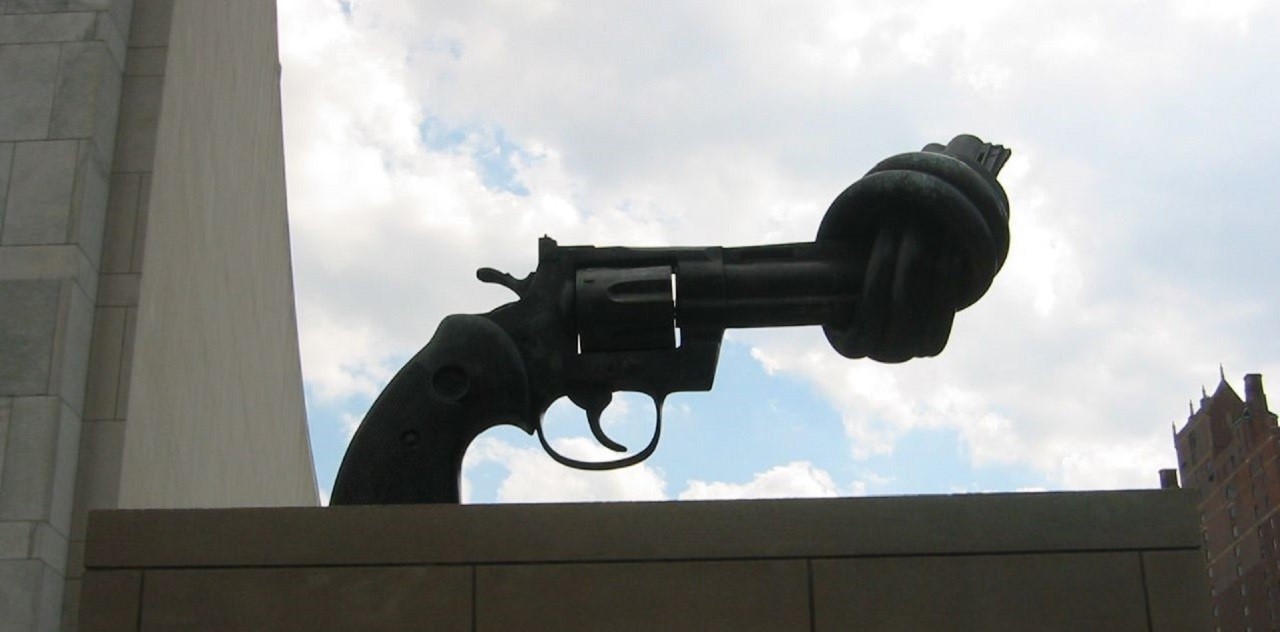Contemporary Peace Research and Practice By Denise Garcia | 03 March, 2021
You Can’t Bomb the Virus! Warming to a New Security for the Common Good

Photo credit: WorldIslandsInfo.com/Flickr
Countries spend vital funds to stockpile expensive weapon systems at the cost of making actual necessary investments to protect their populations. National security calculations presuppose that power and status equate with costly weapons accumulation. However, none of the challenges that pose existential dangers to nations in the 21st century can be tackled with weapons, or solved by one country acting alone, or even fought with military means. The global pandemic reveals that countries’ investment in national security is irrelevant in confronting actual threats. The time is ripe for a transformation now; nations face the same danger all at once: a move towards a human-centered approach to national defence. If the current global order cannot be transformed in the wake of the worst crisis since World War II, then when? The answer to this question is one that the global order might not be ready for, but it is time to act.
The Nobel Peace Prize laureate Campaign to Abolish Nuclear Weapons calculates that the United States spends 35.1 billion dollars annually to maintain its nuclear systems in the name of “national defense.” This amount could pay for: 300,000 beds in intensive care, 35,000 ventilators, 150,000 nurses, and 75,000 doctors every year. It is time to realise that the military-centred approach to security does not protect—and in fact, it has failed—citizens all over the world who are now sick, will become infected by COVID-19, and are vulnerable to the ravages of climate change chaos. After all, you cannot bomb the virus, and it will not be possible to fix the climate either.
What are weapons and bombs worth in combating the virus? They rob citizens of the resources to combat actual perils. Since writing one of the first books linking arms flows to international (in)security, I continue to dwell on the question of why all countries divert their national resources, financial and intellectual, to accumulating weapons and the futile military-centric attitudes to security. Nations cannot attack the virus or protect their populations with the arms in their arsenals.
Almost 2 trillion dollars was spent on the military in 2019 globally. The most significant arms importers in the period 2015-2019 were also unprepared for the pandemic: Saudi Arabia, India, Egypt, Algeria, Iraq, and Pakistan. These countries could have spent on their citizens’ human security to withstand the shock brought about by the pandemic.
The major powers are also busy developing (with little or no public scrutiny or oversight) new weapon systems that will use Artificial Intelligence (AI) to defend them, supposedly, against future wars. I have been a member of the International Panel on the Regulation of Autonomous Weapons, an interdisciplinary group of scientists working since 2017. I have testified to the United Nations discussions on the matter. The major powers are preparing for future “algorithmic warfare” that will rely on AI to enhance its objectives. I submit that preparing for algorithmic warfare will not successfully defend people from the main hazardous threats at hand. On the contrary, it will expose (once again) how ill-equipped countries are to fight the actual battles of a non-military nature that lie ahead. Furthermore, AI has vast potential to be employed for the common good of humanity, not to be weaponised. No AI for war.
After we emerge from this COVID-19 global crisis, how can countries transition to a new security regime designed for the common good of humanity? The operational framework for this is the 17 United Nations Sustainable Development Goals (SDGs), unanimously agreed upon by all nations in 2015. The SDGs offer a historical and concrete road map for action that will deliver human security for all peoples. The SDGs provide an explicit and material unifying platform to promote development for all. The implementation of the goals is data-driven, evidence-based, and powered by science. The pandemic focuses minds on the trends that amplify and compound the problem: expanding populations, the effects of climate destruction, the fast pace of the development of new technologies; these all call for human security-centred approaches to national defence.
In previous works, I have investigated ways to shift from the obsession with military security to a human-focused national security. A recent high-profile report by the Commission for the Human Future corroborates my point. corroborates my point. It is necessary to move away from addressing outdated conventional threats to security that demand the disbursement of billions of dollars in weapons systems, and instead implement the SDGs with all the intellectual and economic firepower of all nations. Pope Francis has called for a halt to the manufacture of arms, and warned against “spending vast amounts of money that ought to be used to care for others and save lives”.
The year 2020 started with the devastating Covid-19 pandemic with the ensuing worst economic crisis since World War II. However, this year also marks the 50th anniversary of Earth Day, the 75th birthday of the United Nations, the 5th anniversary of the United Nations Paris Agreements on Climate Change, and the UN SDGs. All these commemorations remind us of the renewed opportunity to prevent human suffering one more time collectively for the common good of humanity.
Denise Garcia is professor at Northeastern University, Boston. She is author of the forthcoming book: When A.I. Kills: Ensuring the Common Good in the Age of Military Artificial Intelligencea and a member of the Toda Peace Institute International Research Advisory Council. She is also Vice-chair of the International Committee for Robot Arms Control.